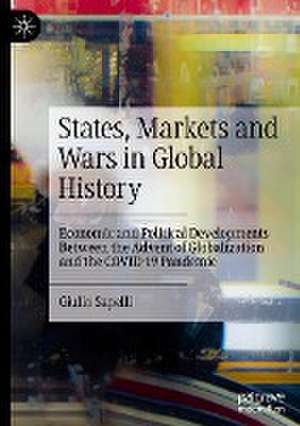States, Markets and Wars in Global History: Economic and Political Developments Between the Advent of Globalization and the COVID-19 Pandemic
Autor Giulio Sapellien Limba Engleză Hardback – 2 oct 2023
Preț: 730.35 lei
Preț vechi: 890.66 lei
-18% Nou
Puncte Express: 1096
Preț estimativ în valută:
139.75€ • 152.28$ • 117.76£
139.75€ • 152.28$ • 117.76£
Carte tipărită la comandă
Livrare economică 23 aprilie-07 mai
Preluare comenzi: 021 569.72.76
Specificații
ISBN-13: 9783031267154
ISBN-10: 303126715X
Pagini: 296
Ilustrații: XIII, 296 p. 3 illus.
Dimensiuni: 148 x 210 mm
Greutate: 0.52 kg
Ediția:1st ed. 2023
Editura: Springer International Publishing
Colecția Palgrave Macmillan
Locul publicării:Cham, Switzerland
ISBN-10: 303126715X
Pagini: 296
Ilustrații: XIII, 296 p. 3 illus.
Dimensiuni: 148 x 210 mm
Greutate: 0.52 kg
Ediția:1st ed. 2023
Editura: Springer International Publishing
Colecția Palgrave Macmillan
Locul publicării:Cham, Switzerland
Cuprins
Introduction.- 1. The Extraordinary Changes.- 2. The Invertebrate World- 3. Theory for the New World.- 4. The Reason of State and Russia.- 5. Instability.- 6. Growing Global Divergence.- 7. Here We Go Again. - 8. The Syrian Crisis: See Between the Play of Mirrors.- 9. Economic Madness, Technocracies, and the Fable of Energy Transition.- 10. After the City in Capitalism as a Religion.- 11. The Mystical Body of Europe and the Central Banks.- 12. The Return to Moral Economy.- 13. To Conclude (in the global pandemic).
Notă biografică
Giulio Sapelli has taught Economic History and Political Economy at universities in Europe, in two Americas, Australia and New Zealand. He has worked as a consultant and board member in industrial and financial groups. Among his latest publications is Beyond Capitalism, published by Palgrave Macmillan (2018).
Textul de pe ultima copertă
This wide-ranging book focuses on the economic and political changes that have taken place between the advent of globalization and the COVID-19 pandemic and assesses how this may bring about a profound reconfiguration of the global political system. Sapelli considers a range of developments in different spheres, from international to national politics, military aggressions, and worldwide political trends such as the rise of populism, to illuminate the moment of neoliberal crisis in which we now live. He argues that Europe and its institutions in particular no longer demonstrate a model of diplomacy and statesmanship, with the rise of technocratic structures and elitism reflecting how an ideal of ‘global convergence’ towards liberalism and democracy no longer holds true. The book then considers how a new international order based on the reason of state can be brought about by global cooperation between the US, Russia and China, along with a return to properly regulated finance and a renewed focus on community in the wake of the coronavirus pandemic. The book will be of interest to those working in international economics and international relations, as well as academics of economic history and political economy.
This book is a translation of an original Italian edition. The translation was done with the help of artificial intelligence (machine translation by the service DeepL.com). A subsequent human revision was done primarily in terms of content, so that the book will read stylistically differently from a conventional translation.
Giulio Sapelli has taught Economic History and Political Economy at universities in Europe, in two Americas, Australia and New Zealand. He has worked as a consultant and board member in industrial and financial groups. Among his latest publications is Beyond Capitalism, published by Palgrave Macmillan (2018).
This book is a translation of an original Italian edition. The translation was done with the help of artificial intelligence (machine translation by the service DeepL.com). A subsequent human revision was done primarily in terms of content, so that the book will read stylistically differently from a conventional translation.
Caracteristici
Takes a long-run approach to economic and political development between globalization and the COVID-19 pandemic Considers the origin and growth of neoliberal ideology and its effect on global events Situates current political economic trends within global economic history
